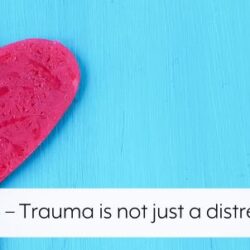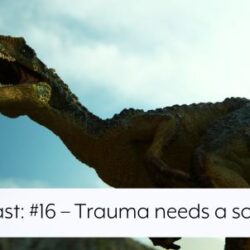
‘Does trauma always involve dissociation?’ someone asked me this week. Good question. But just as my pontificating was about to begin, I slammed on the brakes.
I stopped myself, because any response can sound like an edict, a dogma, ‘the gospel according to …’ By answering in scientific or academic terms we can give an answer that closes down curiosity and hems people in rather than opening them up. When we answer a question, does what we say lead to more insight, or actually to less? Does it lead to more understanding, more compassion, more care? Or do our answers whack someone around the head with ‘rightness’?
In science and academia, of course, it’s important to break things down into exact, definable terms. Precision of language is important. How can you measure something if you can’t even define it, or agree on what that ‘something’ is? But the problems start when we stray into the experience of real, live people. The more tightly we define our terms, sometimes the greater the scope for missing it – for failing to see the person in front of us, the person who is experiencing this thing that we are trying to define. We can end up feeling that their experience ought to match the definition, rather than the definition explaining, and adding colour and texture to, their experience.
The terms ‘trauma’ and ‘dissociation’ are a case in point. They’re not merely or only psychological terms, labels that we can slap onto people, as if people are tins and jars. For sure they are helpful concepts, and it’s always going to be useful to have a shared and common language, an agreed understanding of what we mean by these terms. But the point of a shared and common language is so that we can have a shared and common experience, so that we can more fully empathise with and come alongside one another. If I pronounce, edict-like, the nature of trauma and dissociation, am I increasing the likelihood of a shared experience, or am I decreasing the chances of that?
Many of our experiences in early life that we call ‘trauma’ – and which resulted in ‘dissociation’ – were at the hands of human beings who failed to see us, or hear us, or feel us. In recovering from those experiences, it would be a cruel irony, and entirely unproductive, to talk about ‘trauma’ and ‘dissociation’ in such a way that we also feel unseen, unheard and unfelt.
The danger with using terms such as ‘trauma’ and ‘dissociation’ is that we think we know what we’re talking about, we think we know what the other person is talking about, and so it may curtail our curiosity. It may stop us really listening to the other person, and seeing what it is that they’re trying to say and why they’re saying it. Instead we can assume that we’ve understood them when maybe we haven’t.
So when someone asks me a question such as, ‘Does trauma always involve dissociation?’ of course I’m interested in answering it as an intellectual exercise (my left brain is my comfort zone!) But nowadays I’m also interested in finding the person behind the question. Who is it that has experienced trauma? What does that trauma look like to them? What impact has it had on them? What do they mean by ‘dissociation’ (which above all words surely suffers from ‘multiple meaning disorder’)? What’s the question they’re really asking? What’s their fear? What’s their hope? What’s their shame?
I could answer blithely: I could talk about trauma as a neurobiological response where we enter the red zone of helplessness and freeze in response to perceived life-threat, and how dissociation is the phenomenological adjunct to that dorsal vagal response of the autonomic nervous system, mediated by endogenous opioids, and acting as a brake on active defences in order to minimise further harm. But how does that help – really? In so many cases there’s a frightened person asking a confused question about whether what they’re experiencing is normal, what they should do about it, whether they’re at fault, and whether there is hope for recovery. I’m more interested in addressing those questions than rattling off some theoretical spiel.
‘Why are you asking?’ I respond, eventually, with the brakes applied to my left brain. ‘What’s behind the question?’ There is a brief flash of surprise, and then out pours a narrative of fear and shame and confusion, of someone desperately trying to piece the pieces together, to understand their actions and reactions, to find a glimmer of hope in the hopelessness of their symptoms. ‘Tell me what you mean by trauma, and dissociation,’ I say, softly. ‘And tell me what you’re hoping to hear.’
Are the words we’re using, to describe our own experience or to make sense of someone else’s, distracting from human suffering and a bid for connection and support? Or are they tools to be able to come alongside someone in their distress, to really sit with them, and to make them feel heard, and make them feel seen, and make them feel felt?



13 Comments
Excellent. Thank you.
fab
Thank you…really helpful
Thank you….this made a lot of sense.
Thank you for sharing your story – it was unexpected and powerful.
Thank you for sharing your story – it moved me in many ways and has given me hope for my clients and the work we do together
Thank you
My gremlins told me not to leave a comment, but I’m inspired enough to ignore them. Words don’t seem enough, so I’ll simply share how I feel at this moment. Still, quiet, reflective, deeply moved and I’m left with a profound feeling of deep respect for you Carolyn and for your work. I humbly hope I continue to carry that respect with me in my life and my work. Thank you.
Fantastic Carolyn, thank you so much for sharing your story and your insight in the world of trauma, shame and Psychology.
What can I say, I am deeply moved and touched by your story.
I can imagine how much you have worked with yourself and with the great success. There is always a hope for recovery.
Thank you for sharing
Thank you for taking the risk of sharing, you are truly inspirational, so sad to hear of all your young self endured…..and worse of all feeling so shamed. Im so glad you can tune out those shame gremlins, thank you for all your honesty and I love all your work, so validating in times when I am struggling with my own doubts about my competence.
Thank you so much for allowing me to grow through you sharing your story. Janet.
Youre an inspirational and incredible human being and a great inspiration.. Thankyou so much for this course.